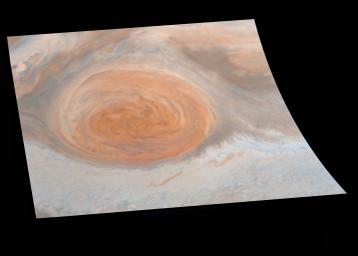
|
True Color of Jupiter’s Great Red Spot
- Click the image above for a larger view
- Full-Res JPEG (2000 x 1431) (108.4 kB)
- Full-Res TIFF (2000 x 1431) (3.9 MB)
Caption:
Roughly true color image of the Great Red Spot of Jupiter as taken by the Galileo imaging system on June 26, 1996. Because the Galileo imaging system's wavelength sensitivities go beyond those of the human eye, this is only an approximation of what a human observer would have seen in place of the Galileo spacecraft. To simulate red as our eyes see it, the near-infrared filter (756 nm) image was used. To simulate blue as our eyes see it, the violet filter (410 nm) image was used. Finally, to simulate green as our eyes see it, a combination of 2/3 violet and 1/3 near-infrared was used. The result is an image that is similar in color to that seen when looking through a telescope at Jupiter with your eye, but allowing detail about 100 times finer to be visible!
Background Info:
The Jet Propulsion Laboratory, Pasadena, CA manages the mission for NASA's Office of Space Science, Washington, DC. This image and other images and data received from Galileo are posted on the World Wide Web, on the Galileo mission home page at URL http://galileo.jpl.nasa.gov. Background information and educational context for the images can be found at http://www.jpl.nasa.gov/galileo/sepo .
Cataloging Keywords:
| Name | Value | Additional Values |
|---|---|---|
| Target | Jupiter | |
| System | Jupiter | |
| Target Type | Planet | |
| Mission | Galileo | |
| Instrument Host | Galileo Orbiter | |
| Host Type | Orbiter | |
| Instrument | Solid-State Imaging (SSI) | |
| Detector | ||
| Extra Keywords | Atmosphere, Color, Infrared, Storm | |
| Acquisition Date | ||
| Release Date | 1997-09-07 | |
| Date in Caption | 1996-06-26 | |
| Image Credit | NASA/JPL/Cornell University | |
| Source | photojournal.jpl.nasa.gov/catalog/PIA00708 | |
| Identifier | PIA00708 | |
